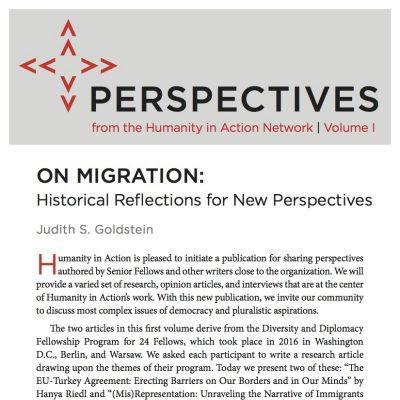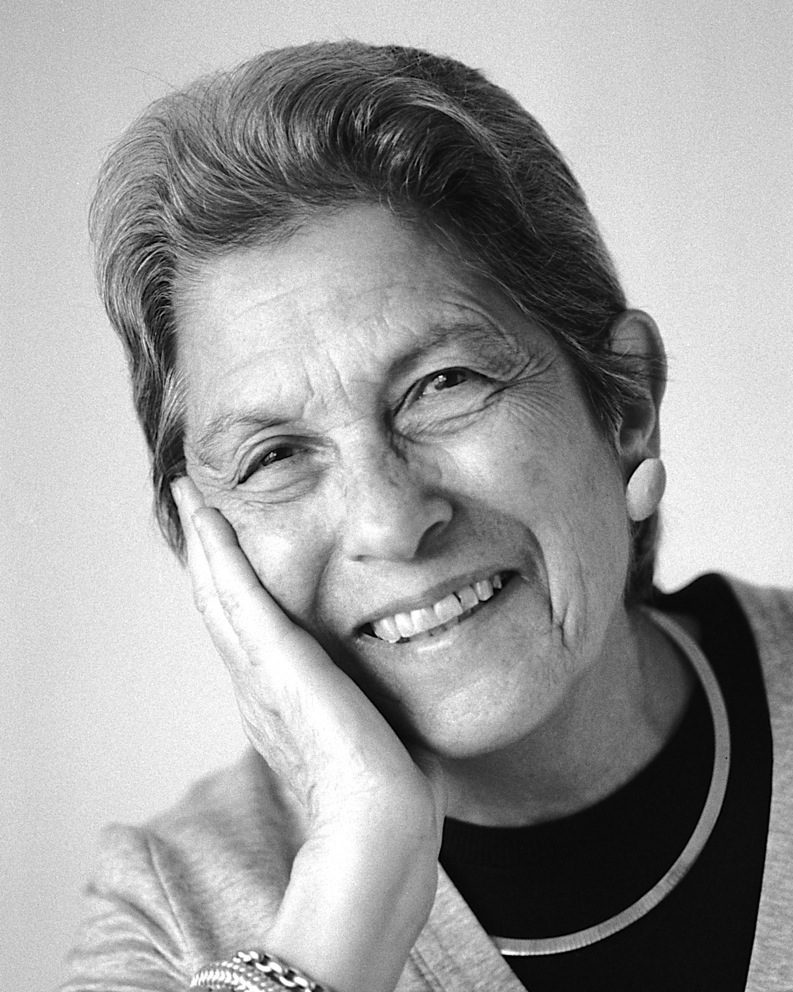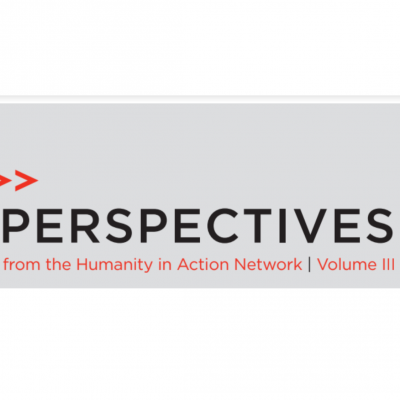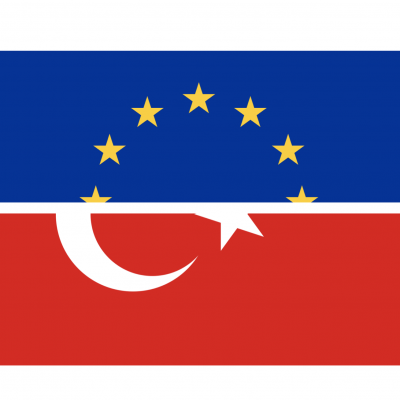Details
Article
Judith Goldstein wrote “On Migration: Historical Reflections for New Perspectives” as part of the PERSPECTIVES Vol. I magazine publication.
Humanity in Action is pleased to initiate a publication for sharing perspectives authored by Senior Fellows and other writers close to the organization. We will provide a varied set of research, opinion articles, and interviews that are at the center of Humanity in Action’s work. With this new publication, we invite our community to discuss most complex issues of democracy and pluralistic aspirations.
The two articles in this first volume derive from the Diversity and Diplomacy Fellowship Program for 24 Fellows, which took place in 2016 in Washington D.C., Berlin, and Warsaw. We asked each participant to write a research article drawing upon the themes of their program. Today we present two of these: “The EU-Turkey Agreement: Erecting Barriers on Our Borders and in Our Minds” by Hanya Riedl and “(Mis)Representation: Unraveling the Narrative of Immigrants As Contemporary Economic Threats” by Jennifer Kuklenski. Both articles focus on challenging some of the negative rhetoric in discourses about migration and integration. They, so we hope, will contribute to steering these discourses into a direction that is inclusive, democratic, and sustainable.
“Many European societies regarded themselves as comfortably and safely homogenous, despite the long-standing reality of diversity.”
It is impossible to exaggerate the importance of contemporary mass migration from the Middle East and many African countries. Refugees need to escape political peril, and many migrants want to improve their lives. European populations struggle to find a balance between providing a safe haven for those in need and a desire to preserve and protect traditional European socio-political practices and cultures. Europe has thrown itself into uncertainty and fear. Post-war European institutions, predicated on human rights doctrines and the avoidance of international conflicts, no longer ensure stability.
This should hardly be surprising. And yet it is. We respond to the pressures in a state of shock and political disarray. Despite the movement of so-called guest workers in the 1950s and 1960s, despite the influx of populations drawn from former or existing colonies, and despite the seemingly open acceptance of refugees seeking political asylum in many European countries through the 1990s, the sheer presence of diversity and pluralism has not caused politicians to address—sufficiently or imaginatively—the pluralistic tensions in European countries. Many European societies regarded themselves as comfortably and safely homogenous, despite the long-standing reality of diversity. Most ignored or repressed the memories of massive migration and displacement that engulfed Europe from the 1920s through the late 1940s: strict border restrictions of the 1930s based on fears of migration from Poland, World War II that displaced and eradicated entire populations, ethnic cleansing from 1945 to 1949, or the impact of decolonization. The conflicts in the 1990s in the Balkans, even with the outflow of refugees to the West, seemed out of step with the spirit of equanimity in the new Europe. The public and their leaders avoided the hard questions—unquestionably without easy resolution—imbedded in integration, assimilation, and sustaining unified civic cultures in advanced social welfare states.
History repeats itself in this regard: migrations consistently take place and continue to be driven largely by conquest, wars, explorations, commerce, and environmental forces.
No matter the gains or losses, population changes introduce different languages, religions, cultures, and identities.
What have we learned about the fragility of states and social cohesion? In On Tyranny: Twenty Lessons from the Twentieth Century, Timothy Snyder asserts the following thought in the Prologue: “History does not repeat, but it does instruct.”1 It is a warning of sorts from a great historian. Matters of migration and immigration, however, might be an exception to Snyder’s contention. Movements of populations are endemic to human history. History repeats itself in this regard: migrations consistently take place and continue to be driven largely by conquest, wars, explorations, commerce, and environmental forces. The circumstances of movements differ in terms of causes and outcomes, but migrations are inherently and inevitably challenging to the stability of a society. No matter the gains or losses, population changes introduce different languages, religions, cultures, and identities. They may intrude on established patterns of life and challenge definitions of national and religious histories and customs. They require societal change among host populations and newcomers. We resist change brought on by ‘Others’ as we know ourselves, in part, because we differ from those who are different.
Many of us have forgotten that we have all too frequently immersed ourselves in racist and xenophobic beliefs and actions. The United States exemplifies this all too well when confronted by real or imagined migrations. In the 1920s, the country shut its borders to all immigrants except white Christians blessed to have been born in Western Europe. The rest of the world’s population was considered unsafe, unhealthy, and unworthy of the benefits of American life. In the early 1920s, in a spectacle of frenzy and hatred, the country deported thousands of suspected foreigners and traitors. Over the ensuing four decades, the United States integrated millions who had entered before the restrictive laws were in place. By the 1960s, the country—awake to its historic tradition of refuge—was ready once again to open up to those it had once feared: immigrants from Asia, Africa, Central and South America, and Eastern Europe.
The Diplomacy and Diversity Fellowship: Humanity in Action’s Diplomacy and Diversity Fellowship engaged nearly 400 foreign policy experts in discussions on pluralism and human rights from 2014 to 2016. The fellowship sponsored the study and research of 72 graduate student Fellows from the United States and Europe. The Fellows convened in Berlin, Paris, Warsaw and Washington. The articles constitute the original work of Fellows in the 2016 Diplomacy and Diversity Fellowship.
And now the traditional cycle of acceptance and rejection is once again in full force. History repeats itself. The United States is engaged in another xenophobic run. But history also instructs. In America, some of us remember the shameful events of 1920s, and resist the current orders to ban Muslims and the outbursts against Hispanics in our midst. In Europe, Chancellor Angela Merkel and President Emmanuel Macron refuse to engage in immigrant baiting as they seek to confront the crosscurrents of conflicting pluralistic forces. The recent French election presented competing versions of national identity that in large part derived from diversity and France’s former domination of Algeria. Max Fischer and Amanda Taub reported in the New York Times on those tensions: “The National Front…draws subtle parallels between the Algerian independence fighters and disorder in immigrant neighborhoods today. The left also uses Algeria as a metaphor, drawing a parallel between colonial-era abuses and the policing of Muslims today.” The writers conclude starkly: “…the heat of those arguments might obscure a deeper problem: Debates over integration of immigrants cannot be resolved without agreement over the core values into which new arrivals must integrate.” (1)
Thus the vexing problem and contemporary democratic challenge: to define and ultimately to adhere to core values that form the basis of integration for migrants and their children. This process evolves within the histories—in the shadows—that all too often involve conflicts over national heritages, different cultures, and identities. The morning after Emmanuel Macron’s victory for the French Presidency, Anne Applebaum of the Washington Post wisely observed:
“Macron can only succeed if he accepts that this is now the essence of politics in Western democracies: An open fight against the toxic appeal of false promises and divisive, nativist nostalgia. There is no point mourning the “normalization” of populism, or in trying to silence Le Pen and her many like-minded colleagues in Europe and the United States. They are here to stay, and they will only be defeated through open confrontation, a growing economy and better security, not censorship and shocked faces.” (2)
It is the responsibility of Humanity in Action to remember the history of racist and xenophobic fury that was often—but not only—aimed at refugees and immigrants; resist the inertia of civic bystanders, provide scholarly and civic leadership and open confrontation, as Applebaum demands. The two articles by Riedl and Kuklenski focus on the immediate impact of migrations— the opportunities and the resistance they provoke. Although the authors do not dig deeply into the past nor speculate about the future, they skillfully challenge the efficacy and fairness of the current attempts to create protective barriers on national and collective borders. The articles raise stark questions about core values, purposes, needs, and social cohesion. We welcome their work as well as articles that will follow. With this new publication we invite our community of Senior Fellows and others interested in these issues to discuss the enduring complexities of democracy and pluralistic imperatives and aspirations.
• • •
References
- Timothy Snyder, On Tyranny: Twenty Lessons From The Twentieth Century (10th ed. Tim Duggan Books, 2017).
- Max Fisher and Amanda Taub, “Echoes Of Colonial Conflict In Algeria Reverberate In French Politics,” New York Times, May 1, 2017. 3




